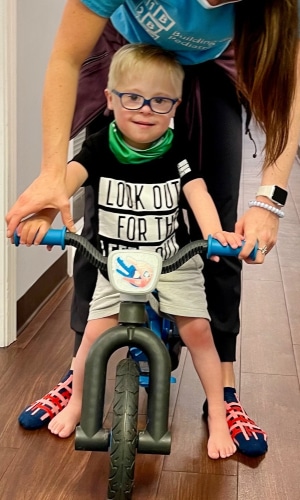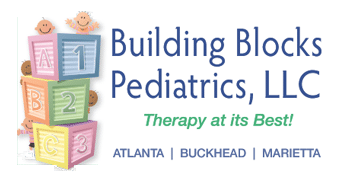Physical Therapy
What is Physical Therapy?
Physical Therapy is provided to children from birth to twenty-one who are experiencing functional limitations or disability due to a disorder, a disease process, or trauma. The goals of treatment are to diminish impairments and to prevent or decrease disability, while enhancing reflexes, improving tone, range of motion, and strength, as well as motor skills and functions. Treatment may be focused on improving developmental tasks, motor planning, manipulation skills, balance, and/or coordination.
Children that would benefit from Physical Therapy have diagnoses that would include, but not be limited to: Developmental Delays due to prematurity, Neurological Disorders such as Cerebral Palsy, Congenital Hypotonia, Genetic Syndromes, i.e. Down Syndrome, Hydrocephalus, Spina Bifida, Musculoskeletal Disorders, such as scoliosis, Arthrogryposis, Muscular Dystrophy, Torticollis, Club Feet, Orthopedic Injuries, Spinal Cord Injury, Autism, Cancer, or other Trauma.


The child may present with difficulties with positioning, ambulation, communication, attention, cognition, and/or motor function. The Physical Therapist will: assess for range of motion, muscle tone, and strength, determine the presence or absence of developmental reflexes, and create a treatment plan to enhance motor function while decreasing the influence of any issues that would interfere with acquiring motor skills that are appropriate for your child’s age. The P.T. will develop an extensive home program, which you and any other caregivers will be able to perform in your home.
Your Physical Therapist will make recommendations regarding stretching and other exercises, therapeutic handling, functional activities, seating and positioning, orthotics, and assisting devices. Standardized tests might be administered to measure and monitor improvement, as well as to help identify short and long-term goals that will be customized for your child. Your Physical Therapist will be instrumental in choosing appropriate adaptive equipment for the classroom or home.


Common Conditions a Physical Therapist may treat include
- Arthrogryposis
- Ataxia
- Autism
- Cerebral Palsy
- Coordination Difficulties
- Delays in Gross Motor Development
- Down Syndrome
- Hypotonia
- Hydrocephalus
- Motor Planning Difficulties
- Muscular Dystrophy
- Musculoskeletal Impairments
- Neuromotor Conditions
- Osteogenesis Imperfecta
- Pervasive Developmental Disorders (PDD)
- Spina Bifida
- Toe Walking
- Torticollis

We Are Here to Help!
Many parents who are visiting the Building Blocks Pediatrics, LLC web site are here to learn about therapy. If you are new to the “therapy world,” we dedicate the following information to you…More
